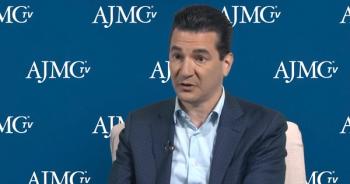
Two recent abstracts presented at the European Respiratory Society International Congress investigated the decision-making and care management for chronic obstructive pulmonary disease (COPD) patients.


Two recent abstracts presented at the European Respiratory Society International Congress investigated the decision-making and care management for chronic obstructive pulmonary disease (COPD) patients.

Two abstracts presented at ECTRIMS 2019, the 35th Annual Congress of the European Committee for Treatment and Research in Multiple Sclerosis, looked at patterns among patients newly diagnosed with multiple sclerosis (MS).

Randomized controlled trials (RCTs) may be considered the gold standard for generating clinical evidence, but there is growing interest in using real-world evidence. However, only a small portion of clinical trials could be replicated in the real world, according to a new study published in JAMA Network Open.

In an effort to educate clinicians about the issue of forcing patients in pain to suddenly halt opioid use, HHS released a guide that emphasizes patient-centered care and recommends against a rapid taper or stopping opioids all at once, while a patient living with chronic pain both welcomed the guide and expressed concern.

Artificial intelligence (AI) is now being used in healthcare practices to risk stratify patients and identify interventions that will work, said John Frownfelter, MD, FACP, chief medical officer of Jvion.

Although minimal residual disease (MRD) is increasingly being used to predict treatment outcomes and as a surrogate marker of progression-free survival, there remains controversy over whether it is ready to be used in treatment decision making.

A recent survey of patients with bipolar I disorder showed the extent to which they are so bothered by side effects to antipsychotic (AP) medications that they will stop taking them, or will trade more symptoms for fewer side effects.

Pimavanserin may be an effective treatment option for patients with Parkinson disease who develop Parkinson disease psychosis, according to a recent study published by Neuropsychiatric Disease and Treatment.

Myelofibrosis has a very heterogeneous disease presentation, which means patients with it can present to the clinic with a number of different symptoms, explained Naveen Pemmaraju, MD, associate professor in the Department of Leukemia at MD Anderson Cancer Center.

While current guidelines recommend that only women with breast cancer who have a family history or who meet clinical criteria undergo genetic testing, a new cost-effectiveness analysis suggests that genetic testing should be expanded to all women with breast cancer.

The marketplace is working to analyze and clean up real-world evidence so it can be used to inform decisions on treatment and coverage, said Scott Gottlieb, MD, former FDA commissioner (2017-2019).

President Donald Trump has issued an executive order that will protect Medicare and bolster Medicare Advantage (MA) in response to Democrats' Medicare for All proposals.

The guiding principle of a lifestyle medicine program is based on addressing the underlying causes of illnesses on multiple levels. The bigger picture is to prevent chronic illnesses in the first place—a major failing of the medical system and medical education.

Ozanimod, under development to treat relapsing-remitting multiple sclerosis (RRMS), has greater efficacy on the annualized relapse rate (ARR) than most other first-line disease-modifying therapies (DMTs), according to 2 abstracts presented at ECTRIMS 2019, the 35th Annual Congress of the European Committee for Treatment and Research in Multiple Sclerosis.

During the second plenary at the National Association of ACOs fall meeting, Meridith Seife, deputy regional inspector general, Office of Evaluation and Inspections in the HHS Office of the Inspector General, presented results from a government report identifying strategies of high-performing accountable care organizations that had improved care quality while cutting costs.

The development and access to orphan indications rely on reimbursement models that require regulatory action toward out-of-pocket costs for patients, said Scott Gottlieb, MD, former FDA commissioner (2017-2019).

In the next 5 to 10 years, providers and health systems need to be thinking about how all the pieces of a new system that delivers holistic, value-based care fit together, said Will Shrank, MD, chief medical officer, Humana, during the opening plenary at the National Association of ACOs fall meeting.

Patients with psoriasis who were treated with biologics were less likely to develop psychiatric illnesses compared with patients not treated with biologics; however, the researchers did note treatment selection may have influenced the findings.

As minimal residual disease (MRD) and other measures to detect cancer burden are increasingly used to predict outcomes and direct future treatment decisions, Amgen has chosen to partner with Adaptive Biotechnologies to use the clonoSEQ product to assess MRD across multiple drug development programs.

Unsustainable healthcare costs are driving seismic changes to the way payers do business and are requiring the ability to extract deeper insights from data assets.

CMS is trying to make a 2-sided risk model in the Oncology Care Model enticing for practices, but there is still a lot of math practices need to work out before making the decision, said Blase Polite, MD, associate professor of medicine and the executive director for accountable care at the University of Chicago.

New research coming from Doximity is adding to the literature on the physician shortage's impact on maternity care, identifying which metropolitan areas are most likely to suffer from a shortage of obstetricians and gynecologists (OB/GYNs) in coming years.

Measurement of drug levels early in treatment with ustekinumab for patients with psoriasis may be able to successfully predict patient response and, therefore, direct a treatment strategy.

Migraines and cluster headaches can have devastating consequences on people’s lives, and there is a need to educate the public about the impact these disorders can have, said Abraham Nagy, MD, chair of neurology at University of Las Vegas and director of Nevada Headache Institute.

Novel therapies come with high costs, but they have the potential to more effectively treat some patients, and employers are struggling to handle the cost burden of them, said Michael Thompson, president and chief executive officer of the National Alliance of Healthcare Purchaser Coalitions.

259 Prospect Plains Rd, Bldg H
Cranbury, NJ 08512
© 2025 MJH Life Sciences®
All rights reserved.
